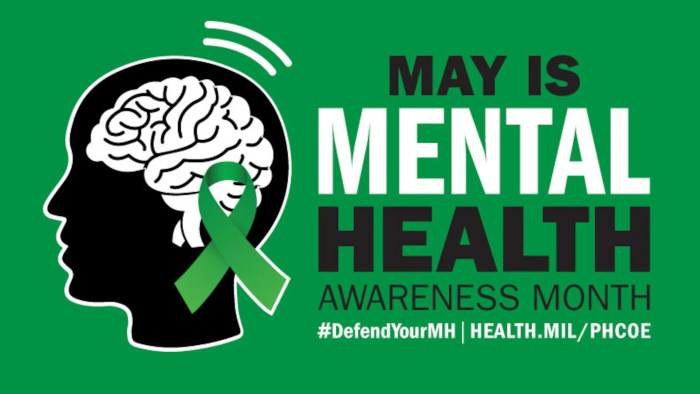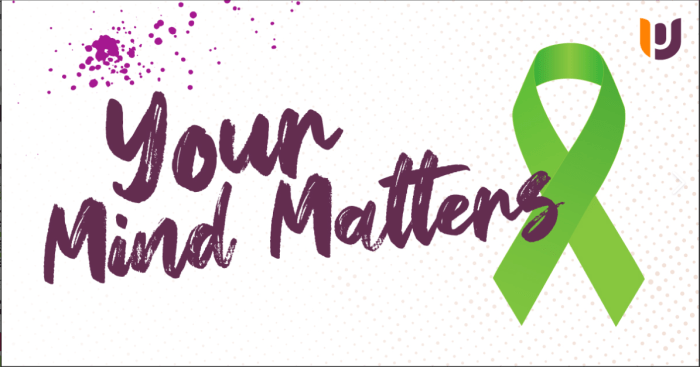Kicking off with Mental Health Awareness, diving into why it’s a game-changer for individuals and society. From busting myths to boosting support, we’re about to break it down real for you.
Importance of Mental Health Awareness
Mental health awareness is crucial for individuals and society as a whole. It helps in identifying, understanding, and addressing mental health issues, promoting overall well-being and quality of life.
Destigmatization and Improved Support Systems
Increased awareness of mental health can lead to destigmatization, breaking down barriers that prevent individuals from seeking help. When people are more informed about mental health conditions, they are more likely to offer support and understanding to those who are struggling.
Strategies for Promoting Mental Health Awareness

To effectively promote mental health awareness, organizations and communities can utilize various methods to reach a wider audience and create a positive impact on individuals’ mental well-being.
Utilizing Social Media Platforms
- Organizations can leverage popular social media platforms such as Instagram, Facebook, and Twitter to share informative posts, resources, and personal stories related to mental health.
- Creating engaging content, hosting live sessions, and utilizing hashtags can help raise awareness and encourage discussions around mental health topics.
- Collaborating with influencers or mental health advocates to amplify the reach of awareness campaigns and destigmatize conversations about mental health.
Implementing Campaigns and Events, Mental Health Awareness
- Organizing mental health awareness campaigns in schools, workplaces, and local communities can help educate individuals about the importance of mental well-being and available resources for support.
- Hosting events such as mental health workshops, seminars, or panel discussions can provide a platform for open dialogue, sharing personal experiences, and offering guidance on seeking help when needed.
- Incorporating mental health awareness into existing events or celebrations to normalize conversations around mental health and reduce stigma associated with seeking help.
Impact of Mental Health Awareness on Communities
Mental health awareness initiatives play a crucial role in positively impacting communities by reducing stigma, increasing access to resources, and promoting overall well-being.
Reducing Stigma
Increased awareness about mental health issues helps break down stereotypes and reduce stigma surrounding mental illness in communities. This leads to more open conversations and acceptance, encouraging individuals to seek help without fear of judgment.
Access to Resources
Communities benefit from mental health awareness through improved access to resources such as counseling services, support groups, and hotlines. When individuals are aware of the available resources, they are more likely to seek help when needed, leading to better mental health outcomes for the community as a whole.
Overall Well-being
By promoting mental health awareness, communities can prioritize mental well-being as an essential aspect of overall health. This focus on mental health leads to a healthier and more resilient community, with individuals better equipped to manage stress, cope with challenges, and support one another during difficult times.
Addressing Stigma Surrounding Mental Health

In today’s society, stigma surrounding mental health continues to be a major barrier for individuals seeking support and treatment. This negative perception can prevent people from reaching out for help, leading to detrimental effects on their well-being.
Negative Effects of Stigma on Individuals Seeking Mental Health Support
Stigma can create a sense of shame and embarrassment in individuals struggling with mental health issues, causing them to hide their struggles and avoid seeking help. This can result in increased feelings of isolation, loneliness, and hopelessness, exacerbating their mental health conditions.
Strategies for Combating Stigma and Creating a Supportive Environment
- Education and Awareness: By providing accurate information about mental health conditions and challenging misconceptions, we can help reduce stigma and promote understanding.
- Open Dialogue: Encouraging open conversations about mental health can create a safe space for individuals to share their experiences and seek support without fear of judgment.
- Media Representation: Promoting positive portrayals of mental health in media can help break stereotypes and reduce stigma associated with mental illness.
- Support Networks: Building strong support networks and communities that prioritize mental health can offer individuals a sense of belonging and acceptance.